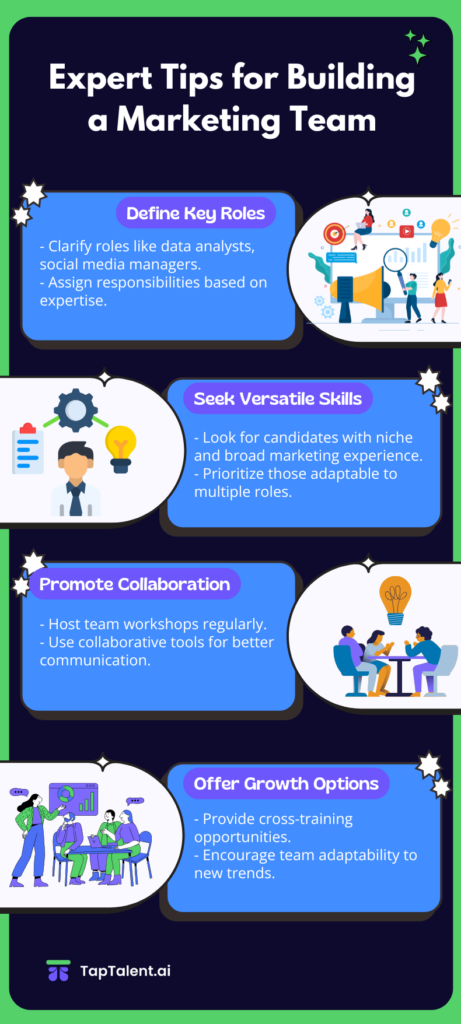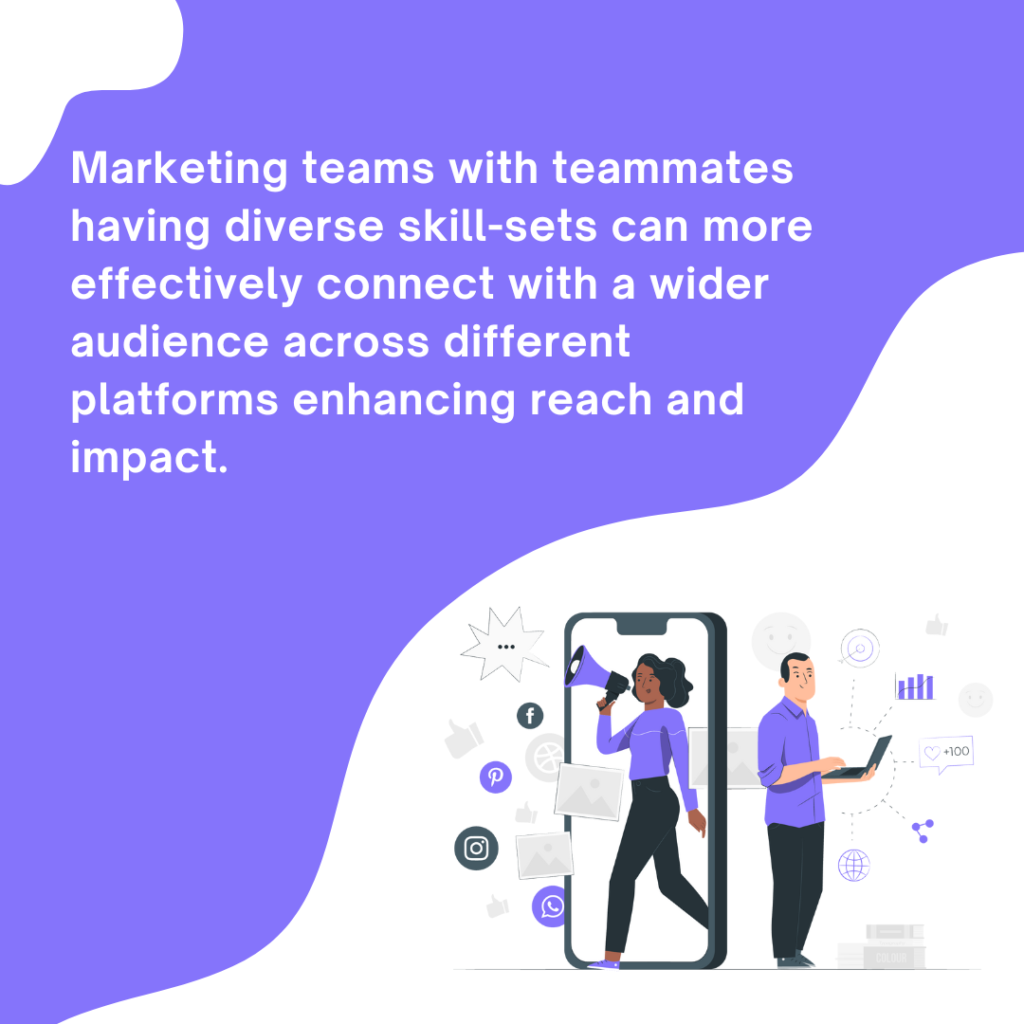A marketing team composed of versatile professionals—each bringing unique expertise and perspectives—can drive innovation and efficiently tackle complex campaigns. From strategists to creatives, analysts, and social media experts, every role plays a vital part in shaping cohesive, effective marketing strategies. This blog explores how assembling a team with varied capabilities not only fosters creativity but also ensures adaptability, positioning your brand for sustained success in an ever-evolving marketplace.
Identify Key Roles for a Balanced Marketing Team
Building a balanced marketing team begins with identifying the essential roles that align with your goals. A well-rounded team isn’t just a collection of individuals but a synergy of complementary skills. Here’s a closer look at the key roles and their contributions to an effective marketing strategy.
1. Marketing Strategists: The Architects of Success
Marketing strategists serve as the backbone of your team, crafting data-driven plans to achieve business goals. They analyze market trends, identify target audiences, and develop comprehensive strategies. By aligning campaigns with overarching business objectives, strategists ensure that efforts are cohesive and impactful. Their ability to think long-term and adapt to changes makes them indispensable in navigating competitive markets.
2. Content Creatives: Bringing Ideas to Life
Creatives, including writers, designers, and video producers, breathe life into marketing strategies. From crafting compelling blog posts to designing visually striking ads, they translate ideas into engaging content that captures attention. Well-written copy paired with captivating visuals drives brand messaging and fosters emotional connections with audiences. Creatives ensure your campaigns are not only informative but also memorable, making them critical for brand storytelling.
3. Data Analysts: Decoding Insights for Growth
In today’s data-driven world, analysts play a pivotal role in deciphering campaign performance and customer behavior. They transform raw data into actionable insights, helping the team refine strategies and optimize ROI. Whether it’s tracking website traffic, measuring email open rates, or analyzing conversion metrics, their expertise ensures your efforts are efficient and measurable.
4. Social Media Managers: Building Online Communities
Social media managers bridge the gap between brands and their audiences. They craft platform-specific strategies, create engaging posts, and foster interactions that build brand loyalty. Their real-time communication skills make them adept at managing crises and capitalizing on trends, keeping your brand relevant in the digital landscape.
5. SEO Specialists: Driving Organic Visibility
No marketing team is complete without SEO specialists who optimize your content for search engines. They conduct keyword research, build backlinks, and ensure your website ranks high on search engine results pages (SERPs). By improving your online visibility, they attract organic traffic and ensure long-term brand growth.
6. Email Marketing Experts: Personalizing Outreach
Email marketing specialists focus on delivering tailored messages to engage leads and retain customers. By segmenting audiences and crafting personalized campaigns, they ensure your communication feels relevant and impactful. Their role is vital in nurturing relationships and driving conversions.
7. Marketing Technologists: Enhancing Efficiency with Tools
Marketing technologists manage the tools and platforms that streamline your campaigns. From automation software to CRM systems, they ensure the team operates efficiently. Their technical expertise supports seamless execution and data integration, helping the team stay ahead of the curve.

Recruit for Complementary Skill Sets
When building a marketing team, focusing on complementary skill sets is crucial. A diverse mix of expertise and adaptability ensures your team can handle multifaceted campaigns while staying agile in a fast-paced environment. Striking a balance between specific skills and versatility enables your team to thrive across marketing functions.
Key Marketing Skill Sets to Prioritize
-
Strategic Thinking: Candidates with strong analytical and problem-solving skills can map out marketing strategies that align with business goals. These individuals excel at connecting the dots between market trends, audience behaviors, and campaign objectives.
-
Creativity: Look for professionals who can think outside the box to craft engaging content, compelling ad copy, or unique brand experiences. Creativity fuels storytelling, which is a cornerstone of effective marketing.
-
Technical Proficiency: Marketing today requires familiarity with digital tools like CRM software, analytics platforms, and automation tools. Specialists in SEO, PPC, or email marketing bring technical expertise that ensures campaigns are efficient and impactful.
-
Data Analysis: Data-savvy marketers can interpret metrics and uncover actionable insights, making them essential for optimizing performance and demonstrating ROI.
-
Adaptability: With the dynamic nature of marketing, candidates who are quick learners and open to new tools and methods are invaluable. Adaptability ensures your team stays relevant as trends evolve.
-
Interpersonal Communication: Strong communicators foster collaboration within the team and build meaningful relationships with clients or stakeholders.
Hiring for Versatility and Specialization
A successful marketing team requires both specialists and generalists. Specialists bring deep expertise in areas like SEO, content marketing, or social media management, ensuring technical precision. On the other hand, generalists contribute their ability to wear multiple hats, bridging gaps between roles and adapting to shifting priorities.
Encourage cross-functional experience by hiring candidates who are open to working across domains. For example, a content writer with basic SEO knowledge or a data analyst who understands user behavior adds extra value by connecting skills across marketing functions.
Recruitment Strategies for Complementary Skill Sets
-
Define the Role Clearly: Create detailed job descriptions that specify the skills required while leaving room for adaptability. Highlight opportunities for growth within the team.
-
Leverage Diverse Channels: Post job listings on niche platforms catering to marketing professionals. LinkedIn, industry-specific job boards, and networking events are excellent sources of talent.
-
Assess Beyond Resumes: Use real-world tasks during the hiring process to gauge practical skills and adaptability. Assign projects that simulate day-to-day tasks, like drafting a social media campaign or analyzing engagement metrics.
-
Promote Continuous Learning: Show potential candidates that your organization values upskilling. Offer training programs or certifications to keep their skills sharp.

Encourage Cross-Functional Collaboration
A marketing team thrives when its members work seamlessly across roles, fostering a dynamic and innovative environment. Cross-functional collaboration not only enhances creativity but also ensures that every team member learns from diverse perspectives, contributing to more robust and well-rounded campaigns.
Fostering a Collaborative Work Environment
Creating a culture of collaboration starts with establishing clear communication channels. Encourage regular team meetings where marketers can discuss challenges, share updates, and brainstorm ideas collectively. Tools like Slack, Trello, or Asana can facilitate seamless coordination, ensuring transparency in projects and tasks.
Assigning cross-functional projects is another powerful way to encourage teamwork. For instance, pairing content creators with data analysts can yield content strategies driven by analytics. Similarly, involving social media managers in campaign planning alongside strategists ensures that ideas are aligned from the ground up.
Promoting Internal Training and Knowledge Sharing
Internal training sessions and workshops are excellent avenues for sharing expertise across roles. Encourage team members to present their area of specialization to others, whether it’s the latest trends in SEO, content storytelling techniques, or insights from marketing data. This not only enriches the team’s skill set but also builds mutual respect for each other’s contributions.
Workshops and “lunch and learn” sessions can break down silos, enabling specialists to gain a broader understanding of how their work impacts other functions. For example, a creative designer learning about email open rates can design visuals optimized for clicks, enhancing campaign effectiveness.
Benefits of Cross-Functional Collaboration
- Enhanced Innovation: Different perspectives spark creativity, leading to innovative solutions for complex marketing challenges.
- Increased Efficiency: By understanding the nuances of other roles, team members work more cohesively, reducing bottlenecks.
- Skill Development: Collaboration broadens individual skill sets, fostering professional growth and adaptability.
- Stronger Team Bonds: A collaborative approach builds trust and camaraderie, creating a positive work culture.
Focus on Flexibility and Growth Potential
In the ever-evolving world of marketing, adaptability and growth potential are vital traits for building a resilient team. Seeking candidates who embrace change and providing opportunities for their development ensures your team stays competitive and innovative.
Prioritizing Adaptability in Recruitment
Modern marketing demands professionals who can quickly adapt to emerging technologies and trends. During the hiring process, assess candidates’ openness to learning and their ability to pivot strategies when needed. Look for individuals with diverse experiences across channels like social media, content marketing, and data analytics. This versatility ensures they can contribute to multiple areas of the team when priorities shift.
For example, a content writer familiar with SEO tools like Ahrefs or Semrush is better equipped to align creative strategies with data-driven insights. Similarly, a graphic designer who understands UX principles can contribute beyond traditional branding efforts.
Offering Growth Opportunities
Creating an environment that values growth keeps team members motivated and engaged. Offer structured learning paths through online courses, certifications, or workshops focused on emerging skills like AI-driven marketing, programmatic advertising, or marketing automation. Providing access to platforms like Coursera, HubSpot Academy, or LinkedIn Learning can make this process seamless.
Encourage employees to take on stretch assignments, such as leading a campaign or experimenting with new tools like ChatGPT for content creation. These opportunities not only foster professional development but also uncover hidden talents within your team.
Cross-Training for Enhanced Versatility
Cross-training team members across roles ensures flexibility and smooth collaboration. A data analyst learning about content strategy, for instance, gains insights into audience behavior that can guide creative efforts. Similarly, social media managers trained in basic graphic design can produce on-the-fly visuals without delaying campaigns.
Regularly rotate team members into different projects to expose them to various aspects of the marketing ecosystem. This approach not only broadens their skill sets but also fosters a deeper understanding of how individual roles contribute to the bigger picture.
Conclusion
Building a versatile marketing team requires a deliberate approach to identifying key roles, recruiting complementary skill sets, fostering collaboration, and prioritizing flexibility and growth. Each strategy plays a vital part in creating a balanced team capable of tackling diverse challenges with creativity and precision.
By emphasizing adaptability and promoting continual learning, you ensure your team stays aligned with evolving marketing trends and technologies. A well-rounded team isn’t just an asset—it’s the foundation of long-term marketing success in an ever-changing landscape. Check out taptalent.ai for free, and discover how you can optimize yourentiet recruitemnt process and save time, reduce time to hire and also build a bettter and more diverese ream withoout wiring ..




